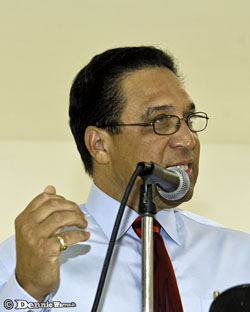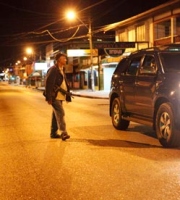Archive for September 8th, 2011

Pistol and ski mask recovered, two arrested
(CNS): Police officers have recovered a loaded semi-automatic pistol, a ski mask, gloves and camouflage clothing and arrested a man and a woman following a police operation in the Prospect area. The RCIPS have reported that at around 11:30am today (Thursday 8 September) the RCIPS Air Operations and K-9 Units, together with the Uniform Support Group and Drugs and Serious Crime Task Force, mounted a targeted operation on a house in the Marina Drive area of Prospect. During that operation a loaded .45 semi-automatic pistol was recovered along with a ski mask, gloves and camouflage clothing. The man and the woman were arrested at the location on suspicion of possession of an unlicensed firearm. They remain in police custody while enquiries are ongoing.
"This was a well-planned and executed operation involving specialist resources of the RCIPS,” said Superintendent Kurt Walton.” It is one of many operations we have and will continue to carry out as a direct response to the gun related crime which is currently blighting Grand Cayman. The public can expect to see many more of these high profile operations take place during the coming weeks.
“We also warned earlier this week that the amnesty window is now closed. Anyone who is in possession of unlicensed or illegal weapons can expect that they will be in our sights and our aim is to take them and the deadly weapons they hold off the streets.”
Anyone with information about gun crime in the Cayman Islands should contact their local police station, the RCIPS tip-line 949-7777 or the confidential Crime stoppers number 800-8477 (TIPS).
Info boss warns of future need to release bid details
(CNS): As controversy continues in connection with government’s procurement process, the information commissioner has upheld a decision by the finance ministry not to reveal details of the unsuccessful bidders in the first round of bids for the financing of government’s loan last year but has warned that things need to change. In her fifteenth ruling Jennifer Dilbert said that on this occasion all parties believed the information contained in their bids would remain confidential unless successful but she said new guidelines are now needed to advise bidders going through the central tendering process that the FOI law requires disclosure once the process is complete.
Dilbert explained that bids should always remain confidential during the bidding process for obvious reasons but the need to maintain confidentiality about those bids decreases over time once a tender has been awarded as she pointed out the importance of transparency in this area.
“Once the bid selection process has been concluded, there is an important public interest in ensuring that government, including the CTC, and the entity have acted in an accountable manner in selecting the successful bidder, and that they have secured the best possible value for money on behalf of the government,” Dilbert said in her report.
During her most recent hearing, which dealt with an FOI request for the details of all of the bidders in the first request for proposals on the government loan, advertised in July 2010, Dilbert found that the guidelines being used for the tendering process were out of date.
“More than two and a half years later, access guidelines that take account of the requirements of the FOI Law have still not been developed, and government's approach to openness and transparency, as embodied in the FOI Law, has still not been incorporated into the guidelines,” the information commissioner found. “The fact that the guidelines in question are essential to government's procurement process, and significantly define and affect the interaction of government with the private sector, only exacerbates the severity of this situation.”
Dilbert said the situation was unacceptable and whether it was intentional on the part of government or not, it cannot expect to hide behind out-of-date guidelines to avoid its legal obligations, especially as it has had plenty of time to update them. She pointed out that no guidelines could be used to “contract out” of primary legislation, and where there is a contradiction, the law must supersede the guidelines. She also pointed out that confidentiality clauses in bids don’t constitute contractual obligations on the part of government and cannot override the FOI law.
“Where a public authority enters into a contract, it should ensure that it does not agree to contractual provisions which, by giving guarantees of confidentiality, may run counter to the FOI Law. If it did, it could find itself having to make difficult choices whether to breach the FOI Law, or violate ill-considered contractual confidentiality provisions,” the commissioner warned.
She said government should make every effort to address the guidelines and standard contract clauses, not just for central tendering but in respect of procurementin general in relation to all contracts with suppliers and partners that are likely to result in the creation or receipt of recorded information by government.
In this particular case, however, Dilbert said there was no doubt that all parties acted under the understanding that the responsive records would not be revealed to others unless one bidder was successful. She found that the un-awarded financial tendering bids were exempt from disclosure under FOI, but she pointed out that she would be working with CTC to update guidelines regarding future confidentiality over bids post tender.
During the hearing the commissioner also raised the issue that public authorities needed to be more helpful with applicants. Although in the end the ministry did try to release more information, she again pointed to a number of shortcomings on the part of the ministry of finance during the application process.
Dilbert said the ministry had released some information in a summary table showing the list of companies that bid, the date their respective bids were received, and the “bid amount”, which listed the amount of the long term loan of CI$155,000,000. She said the information provided under the heading “bid amount” was not very enlightening, as it was obvious the applicant was trying to establish the “cost to government” of the bids, not the amount of the loan, which was already public knowledge and did not represent the cost.
“In a tender relating to government financing it is clearly the applicable conditions of repayment including percentages and fees which constitute the bid amount,” she wrote in the report. “I find it unhelpful for the Ministry to represent the loan amount as the 'bid amount'. In previous decisions I have strongly condemned the use of 'semantics' by public authorities, and I continue to find it inappropriate here.”
Dilbert also pointed out that information managers should try to help applicants by releasing information to them that they may not have specifically requested but which is relevant. In this instance she recommended that the ministry release the Evaluation Summary & Tender Award Recommendation (ESTAR) Report. She noted that over seven months after the request was made, the ministry had made an effort to release more information but public authorities should recognize that it is exemptions which should be interpreted narrowly, not requests.
“Although the Ministry did release additional records late in the appeal, it did not disclose the ESTAR report,” Dilbert said, adding that there was no reason why the report could not be made available.
“Public authorities should bear in mind that applicants, even seemingly sophisticated and experienced applicants, may not fully understand the way events unfold, records are kept, and procedures are followed, ” she noted, explaining that it was the duty of public entities to communicate with applicants and release as much information as possible.
See full report below.

HMCI issues reminder of tropical weather dangers
 (CNS): As the Atlantic hurricane seasons moves into what is usually considered its busiest time, Hazard Management Cayman Islands (HMCI) urged people to use their common sense in bad weather to avoid life threatening risks. The HMCI said Hurricane Irene was a category one storm when it hit the northeast United States but it caused 44 deaths that could have been avoided. With one hurricane and two tropical storms currently spinning around the Atlantic and predictions of more to come, HMCI warned people to take care if Cayman is to face tropical weather conditions this season.
(CNS): As the Atlantic hurricane seasons moves into what is usually considered its busiest time, Hazard Management Cayman Islands (HMCI) urged people to use their common sense in bad weather to avoid life threatening risks. The HMCI said Hurricane Irene was a category one storm when it hit the northeast United States but it caused 44 deaths that could have been avoided. With one hurricane and two tropical storms currently spinning around the Atlantic and predictions of more to come, HMCI warned people to take care if Cayman is to face tropical weather conditions this season.
The September report from Emergency Management & Training urged people to use common sense during a storm and said that the deaths during Hurricane Irene were preventable. Three people drowned when they went wading, surfing and wind surfing and two people also lost their lives boating in the storm. Another three people were electrocuted by downed power lines, and eight were killed by falling trees and branches. A further ten people were killed as a result of careless driving on wet and flooded roads.
Underscoring the dangers for residents associated with all tropical storms, HMCI said people had to use their common sense. “People should not be near the sea, and they should not be swimming, surfing or boating,” HMCI Director McCleary Frederick said. “Trees or branches that could damage your house if they fell should be cut down or trimmed. Each year we remind residents to report downed power lines after a storm passes and to follow all safety guidelines when operating generators.”
Frederick also noted that the Emergency newsletter also revealed that Hurricane Irene claimed the life of a paramedic who died trying to rescue people in a car carried away by flood waters.
“Some people have difficulty realizing that if they choose to do something dangerous, they can put other people at risk as well,” Frederick pointed out.
HMCI’s website, www.CaymanPrepared.gov.ky contains more information to keep you, your family, home and business safe.
See the Emergency Management & Training Inc report (www.emergencymgt.com)

Minister says literacy remains a priority in schools
 (CNS): In his message marking the United Nation’s literacy day” Rolston Anglin, the education minister has said that raising literacy standards is being given the highest priority as the benefits of literacy are not limited to reading and writing but a range of life-skills that help society as a whole. He said that literature “can be the vehicle through which students develop respect, responsibility and compassion.” Thursday 8 September, has been designated “International Literacy Day”, by the United Nations Educational Scientific and Cultural Organization (UNESCO) and this year’s theme is “Literacy for Peace”
(CNS): In his message marking the United Nation’s literacy day” Rolston Anglin, the education minister has said that raising literacy standards is being given the highest priority as the benefits of literacy are not limited to reading and writing but a range of life-skills that help society as a whole. He said that literature “can be the vehicle through which students develop respect, responsibility and compassion.” Thursday 8 September, has been designated “International Literacy Day”, by the United Nations Educational Scientific and Cultural Organization (UNESCO) and this year’s theme is “Literacy for Peace”
See Anglin’s full message below.

Motion draws line for UDP
 (CNS): Facing a full complement of ‘United Democratic Party ties’ around members’ necks on Wednesday, Alden McLaughlin recognised that his ‘no confidence’ motion in the current government was doomed to failure even before it began. But undeterred the opposition leader pointed out that this was a line for all government members across which they could not return if they voted against his motion. Once they had offered their support for the premier, none of them could later make excuses to the people of Cayman about not supporting all the actions of the party leader – no matter what they were — when their constituents complained. (Photo Dennie Warren Jr)
(CNS): Facing a full complement of ‘United Democratic Party ties’ around members’ necks on Wednesday, Alden McLaughlin recognised that his ‘no confidence’ motion in the current government was doomed to failure even before it began. But undeterred the opposition leader pointed out that this was a line for all government members across which they could not return if they voted against his motion. Once they had offered their support for the premier, none of them could later make excuses to the people of Cayman about not supporting all the actions of the party leader – no matter what they were — when their constituents complained. (Photo Dennie Warren Jr)
McLaughlin said their decision at the end of the debate to not support his motion would draw a line on any future hopes of distancing themselves from the leader of the UDP. “The line will have been drawn when this vote is taken and the country will be under no illusion that each and every government member supports the premier,” he said. In future, he warned, there would be no more room for quiet discussions with voters, saying that they didn’t really support everything the premier did but “what could they do” as he said everyone would know where they all stood.
Making it clear that he was well aware that the opposition had no hope, even with the support of the independent member, of garnering the necessary two thirds majority required for a no confidence vote to pass, he said the motion served a wider purpose.
As well as making it clear to the people of Cayman that all of the government members of the Legislative Assembly were totally behind the premier in every decision he had made, the motion would hopefully help to provide the people with some answers.
He said it was an opportunity for the premier to tell the people that the opposition was wrong to be concerned about the many issues listed in the motion, as well as others that have since come to light and the government’s stewardship of the country. He said it provided them with the chance to explain the various issues and say why the people should still have confidence in the premier and the UDP to manage the country.
Preparing for the rejection of his motion, the opposition leader noted that all of the members on the government bench were “political animals”, and while some were greater political veterans than others, they were all well aware of the mood of the people and understood the current public sentiment. Pointing to polls in the media, all of which were overwhelmingly against the premier, the opposition leader said that there were “major issues about the way the affairs of the country” were being managed and they would all have to answer to their constituents.
He added that it was up to each of them to search their own conscience, and given the facts, could they all look their constituents in the eye and say, “I have confidence in this government and we are giving the country the best possible stewardship,” the opposition leader warned.
Having read his motion, which was originally filed over four months ago, that included some 24 points of concern, McLaughlin pointed out that with the passage of time some had been withdrawn or addressed through other means but many were still of great concern.
The opposition leader went on to talk about crime and the Cohen & Co deal, and attempted to address the investigation into the premier for “financial irregularities” but was cut short on several occasions by the Speaker.
The Speaker persistently pulled up the opposition leader on the subject and despite comments from the governor confirming that there is a police probe into the premier regarding financial irregularities, she said it should not be described as a criminal investigation. McLaughlin said he did not know of any other type of investigations other than criminal ones that were undertaken by the police but he agreed not to use the word criminal.
Check back to CNS throughout this week for more coverage from the no confidence motion and other business from the Legislative Assembly.
Road starts in ‘good faith’
(CNS): Although no agreement has been signed between it and the government, local investor and developer Dart is beginning work on the Esterly Tibbetts extension “in good faith”, Jackie Doak, the firm’s CEO, said on Tuesday evening. During the groundbreaking ceremony for the public road at Batabano, she said that even though a full agreement had not yet been reached, Dart was prepared to start the road to get people back to work with the expectation that a deal would be signed. Doak also committed to preserving any rare or endangered, culturally significant and mature plants and trees for transplanting as the land clearance for the road went underway.
The Dart boss said she expected some people would question the decision to commence the road works, at some levelof risk to the firm, before there is a signed agreement.
“At Dart we are prepared to get started with the preliminary works as a way to help get people back to work and start engaging local companies now,” she said. “We do so in good faith that the main agreement and the related smaller separate agreements will be signed,” she added.
Welcoming the Cabinet approval of the road project, Doak said theproject was a duly approved project through the required regulatory process. She added that Dart wanted to see the proper processes throughout, such as coastal work licenses and vested lands for all of the projects, even if it took longer than people would like. “It is important to Dart that the appropriate process are followed.”
She told the audience gathered for the groundbreaking event that Dart was fully committed to the alliance with government as it was good for government, good for Dart and good everybody.
The road marked the official start of a number of projects under the ForCayman investment alliance that she said would stimulate the economy in the short term but in the long term would set out the conditions for sustained economic prosperity.
“The extension of the Esterly Tibbetts Highway to Batabano Road has been identified as a necessary and important road for almost a decade,” she said. “It is a project that will directly activate many of the benefits intended in the ForCayman investment alliance as it will put people back to work and create opportunities for businesses.”
She said that while the road would benefit the whole community, she admitted that it would also provide access for the recently acquired properties of Dart.
Doak also revealed that the work packages and requests for proposals would soon be circulated among the local business community by DECCO, Dart’s construction company. She said the critical work of clearing the undergrowth and prepping the land would now start. She said the plants to be transplanted would be identified by the nursery staff during this period.
Vote on the CNS online poll:
Is the ForCayman alliance with the Dart Group a good thing for the Cayman Islands?

Shots fired at George Town house
 (CNS): Police are appealing for witnesses who may have seen who shot at a house in George Town Wednesday night (7 September). Police confirmed finding bullets at the scene inside a home in McField Lane, off Mary Street. The RCIPS said that the house was damaged but no one was injured in the incident. At about 10:50 pm the occupants said they heard what they believed to be two gunshots and then discovered two holes in a front window of their house and contacted police. Officers responded immediately, a spokesperson said, and bullet fragments were recovered from inside the targeted home.(Photo Dennie WarrenJr)
(CNS): Police are appealing for witnesses who may have seen who shot at a house in George Town Wednesday night (7 September). Police confirmed finding bullets at the scene inside a home in McField Lane, off Mary Street. The RCIPS said that the house was damaged but no one was injured in the incident. At about 10:50 pm the occupants said they heard what they believed to be two gunshots and then discovered two holes in a front window of their house and contacted police. Officers responded immediately, a spokesperson said, and bullet fragments were recovered from inside the targeted home.(Photo Dennie WarrenJr)
Police remained at the location throughout the night and are also expected to continue a scene search this morning during daylight hours (Thursday). In the meantime the police wished to “reassure the public that we are stepping up our patrols to provide high visibility policing in that area,” a spokesperson for the RCIPS said.
Anyone with information should contact George Town police station on 949-4222 or the confidential Crime Stoppers number 800-8477(TIPS).

Sex domain registration begins
 (BBC): Companies and celebrities are being given the chance to protect their names from porn hijacking ahead of the launch of the .xxx web domain. From today, brands can request to have their name blocked from use with the new suffix, which goes live next year. Existing adult entertainment sites can also submit their application to reserve a spot on .xxx. The "red light" suffix is intended to make it easier to find or avoid sexually explicit material online. ICM Registry, which is administering the launch, said it hoped to "promote a responsible approach to adult content". Brand and IP holders wanting to register now have 50 days – a so-called "sunrise period" – to submit their application.
(BBC): Companies and celebrities are being given the chance to protect their names from porn hijacking ahead of the launch of the .xxx web domain. From today, brands can request to have their name blocked from use with the new suffix, which goes live next year. Existing adult entertainment sites can also submit their application to reserve a spot on .xxx. The "red light" suffix is intended to make it easier to find or avoid sexually explicit material online. ICM Registry, which is administering the launch, said it hoped to "promote a responsible approach to adult content". Brand and IP holders wanting to register now have 50 days – a so-called "sunrise period" – to submit their application.
Companies and individualsthat do not want their name associated with pornography will be able to pay a one-off fee of between $150 and $300 (£100 to £200), depending on which company they register their domain with.

1500 arrested in Trinidad’s state of emergency
 (CNS): As the number of arrests mount as a result of Trinidad and Tobago's state of emergency, the islands' attorney general, Anand Ramlogan, has said that courts across the country could hold special night sittings to tackle a mounting workload. Almost 1500 people have now been arrested during the state of emergency, which was introduced on Sunday 21 August in six areas in Trinidad in order to tackle a spate of violence that saw 11 murders in just a few days. When Prime Minister Kamla Persad-Bissessar first announced the measure, it was to last just 15 days and include a 9pm to 5am curfew in major cities and towns. However, it has now been extended a further 3 months.
(CNS): As the number of arrests mount as a result of Trinidad and Tobago's state of emergency, the islands' attorney general, Anand Ramlogan, has said that courts across the country could hold special night sittings to tackle a mounting workload. Almost 1500 people have now been arrested during the state of emergency, which was introduced on Sunday 21 August in six areas in Trinidad in order to tackle a spate of violence that saw 11 murders in just a few days. When Prime Minister Kamla Persad-Bissessar first announced the measure, it was to last just 15 days and include a 9pm to 5am curfew in major cities and towns. However, it has now been extended a further 3 months.
According to Trinidad and Tobago's Newsday, Ramlogan said the state was considering asking retired magistrates and judges to return to active duty to fill key gaps in the pool of judicial officers. Furthermore, he said that Prime Minister Kamla Persad-Bissessar and Chief Justice Ivor Archie are discussing the establishment of a special court to deal with firearms offences and the issue of night courts and other contemplated measures. There may also be an increased use of video-conferencing technology to have virtual courts inside of prisons.
Ramlogan noted that legislation to abolish the time-consuming preliminary inquiry procedure will be tabled in the islands' parliament as soon as possible. That legislation, he said, will “dynamite an important jam in the courts.”
Legislation may also be introduced that enables authorities to take DNA samples from people arrested during the state of emergency.
The foreign minister, Surujrattan Rambachan told the New York Times last month that the seizure of $22 million worth of cocaine had set off the violence as gangs sought retribution for the losses. He said 262 people had been killed this year, compared with 325 at this point last year, but he called the rate unacceptable and noted that the prime minister took office last year with a promise to get the problem under control.

UDP ignoring crime, says opposition leader
 (CNS): The opposition leader implored government to "do something about crime" during his no confidence motion on Wednesday in the Legislative Assembly, after telling members that they weren't eunuchs. Despite their claims that crime was not their responsibility, the new constitution gives them more power to influence policy than any elected officials have ever had, Alden McLaughlin pointed out. He also reminded the UDP government that during the election campaign the party had told the electorate that the PPM was failing on crime and if they were elected they would address the issue, but since then crime had reached unprecedented levels.
(CNS): The opposition leader implored government to "do something about crime" during his no confidence motion on Wednesday in the Legislative Assembly, after telling members that they weren't eunuchs. Despite their claims that crime was not their responsibility, the new constitution gives them more power to influence policy than any elected officials have ever had, Alden McLaughlin pointed out. He also reminded the UDP government that during the election campaign the party had told the electorate that the PPM was failing on crime and if they were elected they would address the issue, but since then crime had reached unprecedented levels.
“Not a day goes by without headlines screaming out about the latest robbery,” McLaughlin said, adding that while crime was the leading concern of the entire community, the government continues to ignore the problem. He said the UDP administration had completely failed to do anything at all about the frighteningly high levels of crime. He said he could not remember when the premier had last said anything about what his government intended to do about what everybody believed was the most important issue affecting the country.
While the premier was “running around breaking ground and making promises about grandiose projects that would never happen,” crime was undermining the entire well-being of the country, the opposition leader said. Day after day the business community cried out for something to be done, he added, but as tourists were being robbed, George Town turned into a ghost town and people were afraid to leave there homes in the evening, the premier and his colleagues were silent about the problem.
“There are all sorts of deals and all sorts of promises made but what is the government doing about the crime wave that is washing over us?” the PPM leader demanded to know as the government benches heckled about the PPM leader about giving the power to the governor in the constitution which his government had negotiated.
Pointing to the change in the 2009 constitution, McLaughlin emphasised that the elected arm of government did have more power now and it “must do what it was elected to do and take ownership of the problem,” he said.
He pointed out that the premier and two government ministers as well as the opposition leader now sat on the National Security Council (NSC) giving the elected members far more influence than ever before, but he said the premier was not using that influence.
McLaughlin accused the government of taking the position that crime was the governor's problem and therefore they didn’t have to do anything about it, but that was no longer the case, he stressed. He called on the government members to show the people why they should have confidence in them and their stewardship of the country. He said that when they answered his motion, he hoped they would offer the people something more than excuses and say what the government's policy was to deal with rising crime.
“The people have entrusted them with the affairs of the country and that includes the issue of crime,” he said, but government had not taken their responsibility seriously, he claimed as he accused them of being insensitive about the issue.
The first of the government members to answer the opposition leader's motion was Juliana O'Connor Connolly, the deputy premier, who spoke to the issues McLaughlin raised about crime.
She denied that the government had the power that McLaughlin had implied and said “Cabinet has absolutely no responsibility” when it came to the police. She accused the opposition leader of being an “authority of nonsense” as everyone cared about crime and he was misleading the people when he said the government could influence the police.
She said if the opposition leader was so concerned about crime he should present his solutions to the governor or the police commissioner instead of trying to gain votes by wasting everyone’s time with the no confidence motion. “He should not use crime as a political football, or any other type of football,” she said.